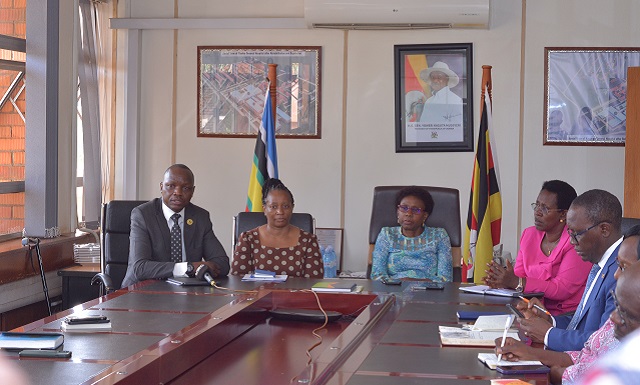
Regional body, IGAD, gives Uganda Shs14bn
ANALYSIS | RONALD MUSOKE | The Intergovernmental Authority on Development (IGAD) has boosted Uganda’s ongoing fight against Ebola and Mpox with Shs 14 billion (US$4 million). The funds are intended for strengthening Uganda’s Emergency/Pandemic Response Plan, particularly in addressing the impacts of Mpox and Ebola viral diseases.
The response was announced on Feb. 13 during a meeting at the Ministry of Health headquarters in Kampala. It was attended by Dr. Jane Ruth Aceng, the Minister of Health, along with the ministry’s top leadership; Mubarak Mabuya, IGAD’s Chief of Staff and Interim Director of the Health and Social Development Division, Dr. Fatuma Adan, the lead of the IGAD PREPARE (Regional Pandemic Preparedness and Response) Project and IGAD Head of Mission to Kenya and Dr. Kasonde Mwinga, the World Health Organizton (WHO) Country Representative to Uganda.
The meeting was aimed at strengthening regional laboratory and surveillance capacities, enhancing workforce development, and improving cross-border collaboration and coordination mechanisms for pandemic preparedness.
Uganda battling Mpox and Ebola
On Jan. 30, the government announced an outbreak of the Sudan variant of Ebola Virus Disease following the death, a day earlier, of a nurse at Mulago National Referral Hospital in Kampala. Since then, the Ministry of Health has detected eight more infections and the patients are undergoing treatment at the Ebola Treatment Unit in Kampala.
Dr. Charles Olaro, the Acting Director General Health Services in the Ministry of Health said in a February 10 statement that the eight cases are currently receiving medical care and are in stable condition. “Of these, seven patients are being treated at Mulago National Referral Hospital, while one patient is at Mbale Regional Referral Hospital.” Dr. Olaro added that another 265 contacts are under quarantine and strict follow-up measures.
Meanwhile, Uganda has been battling MPox since July, last year, when the Ministry of Health confirmed the first cases. According to a situation update published on Feb.11 by the World Health Organisation (WHO) Africa Region Office, Uganda has so far recorded 2,896 confirmed cases and 19 deaths.
At the Kampala meeting, Minister Aceng appreciated IGAD’s consistent response to the Government of Uganda’s requests for support during emergencies related to various outbreaks. She also thanked IGAD and its partners “for their strong collaboration and ongoing relationship.”
“I want, in a special way, to appreciate IGAD for coming in a timely manner to support Uganda to respond to the current outbreaks of M-pox, Ebola, and many others that may come thereafter,” Dr. Aceng said.
“Their timely response and flexibility in reprogramming and mobilising resources over US$ 4 million to support Uganda’s response is deeply appreciated,” she said. “We have established a very fruitful partnership with IGAD, so it is not surprising that IGAD and its partners have responded positively to our government’s appeal for assistance.”
“This support is crucial for enhancing surveillance, strengthening preventive measures, and ensuring effective response strategies to emergencies posed by outbreaks like Ebola and Mpox that threaten the health and lives of Ugandans.”
IGAD bloc
The IGAD bloc comprises eight countries from the Horn and eastern part of Africa, namely; Uganda, Kenya, Somalia, South Sudan, Ethiopia, Sudan, Djibouti and Eritrea. The bloc straddles a geographical area of about 5.2 million sq. km and has a population of about 300 million people.
According to a brief from IGAD, the resources from the bloc are part of the committed US$ 8.3 million from the Pandemic Fund. The resources are allocated to support IGAD member states that are significantly impacted by the Mpox and Ebola diseases.
The IGAD PREPARE Project will initially focus on addressing the Mpox outbreak to mitigate its spread and prevent related mortality. Given the increasing cases of Ebola, the IGAD PREPARE Project has engaged in discussions with the Ministry of Health and partners to integrate the national needs into the initial support. This approach aims to provide effective medium- to long-term solutions for existing and future outbreaks.
While in Uganda, the IGAD PREPARE Project team, in collaboration with project partners including the International Federation of Red cross and Red Crescent Societies (IFRC), the Uganda Red Cross Society, and the World Health Organization engaged in joint discussions to finalise a response plan.
This plan aims to align with Uganda’s pandemic response priorities and address existing gaps, ensuring timely disbursement of funds to the Health Ministry. This will enable the Ministry to effectively and efficiently respond to emergencies, ultimately saving lives through a robust emergency preparedness response system.
In line with the broader One Health agenda, side discussions were also held on the regional post-Mpox/Ebola response plan where the IGAD PREPARE team paid courtesy calls to the Permanent Secretaries of the Ministry of Foreign Affairs, the Ministry of Water and Environment, and the Ministry of Tourism, Wildlife, and Antiquities. These discussions focused on how the ministries and other relevant stakeholders could coordinate their efforts toward a harmonized approach.
This would strengthen regional laboratory and surveillance capabilities, workforce development, and cross-border collaboration for Pandemic Preparedness and Response within the framework of One Health, addressing human, animal, and environmental health for a healthier region.
During the meeting in Kampala, key recommendations were made to ensure the prompt disbursement of funds for Uganda’s emergency response efforts. The Independent understands the funds will be channeled through existing government systems, particularly the National Emergency Coordination Taskforces and Committees.
Close coordination will take place between IGAD, the Ministry of Health, and partners such as the International Federation of Red Cross and Red Crescent Societies (IFRC), the Uganda Red Cross, and the World Health Organization (WHO), who will collaborate to finalize a Comprehensive Response Plan.
“As part of the PREPARE Project, IGAD will focus on promoting community-driven solutions to public health emergencies. We will leverage the World Health Organization’s technical leadership in managing public health crises, along with the International Federation of Red Cross and Red Crescent Societies (IFRC) and its network of volunteers,” said Mubarak Mabuya, IGAD’s Chief of Staff and Interim Director of the Health and Social Development Division.
“We will work in partnership with our Member States to ensure effective regional coordination and collaboration, protecting one another across borders through timely responses.”
Mabuya said it is within IGAD’s mandate to support its member states in various areas, including health, whenever there is a need. He expressed gratitude for the Pandemic Fund provided by the World Bank, through WHO and its partners, for their continuous support, collaboration, and engagement.
The partnership, Mabuya said, aims to offer timely assistance and develop need-based actions and solutions to effectively support Member States in combating Mpox, Ebola, and other emerging cross-border and inter-country epidemics and pandemics, ultimately saving lives.
He said IGAD is happy to support Uganda, one of the founding members of the IGAD bloc. “We do recognise that pandemics such as Ebola, M-pox, have cross-border dimensions (and) we look at this as a regional shared challenge. Therefore, in line with our mandate, we are here to work with the government. We are here to identify the needs, to see where the pressure points are.”
“We are happy to be here to support all the national efforts that are geared towards arresting this problem before it goes beyond the borders of Uganda.” Mabuya said the IGAD Secretariat is aware MPox has already crossed into Kenya and also South Sudan and the bloc is following up with support to Kenya and South Sudan to ensure that the bloc deals with the problem in the region.
Dr. Kasonde Mwinga, the WHO Representative to Uganda, reiterated the UN health agency’s support for Uganda in strengthening the resilience of its health systems. This commitment aims to enhance Uganda’s capacity to respond to current and future outbreaks.
“A promise made is a promise kept,” said Dr. Mwinga. “We want to reaffirm our support and commitment to Uganda, and we are willing to adjust and re-align our objectives to align with Uganda’s national health priorities. This includes not only the responses to Mpox and Ebola but also to all related health issues.”
“We are available to work with this project in terms of technical guidance. And we are also, as an entity working on the pandemic fund, available for monitoring and evaluation for the implementation of this work,” she said, adding that: “As there is flexibility in doing this project, and IGAD has discussed the flexibilities with the government of Uganda, it is important that we also focus on areas that we don’t have to repeat with the next outbreak.”
Dr. Mwinga noted that strengthening the resilience of the bloc’s systems and the different components of its health system remains important. “If that is done, then we don’t have to repeat some investments as we continue to have other disease outbreaks.”
 The Independent Uganda: You get the Truth we Pay the Price
The Independent Uganda: You get the Truth we Pay the Price



